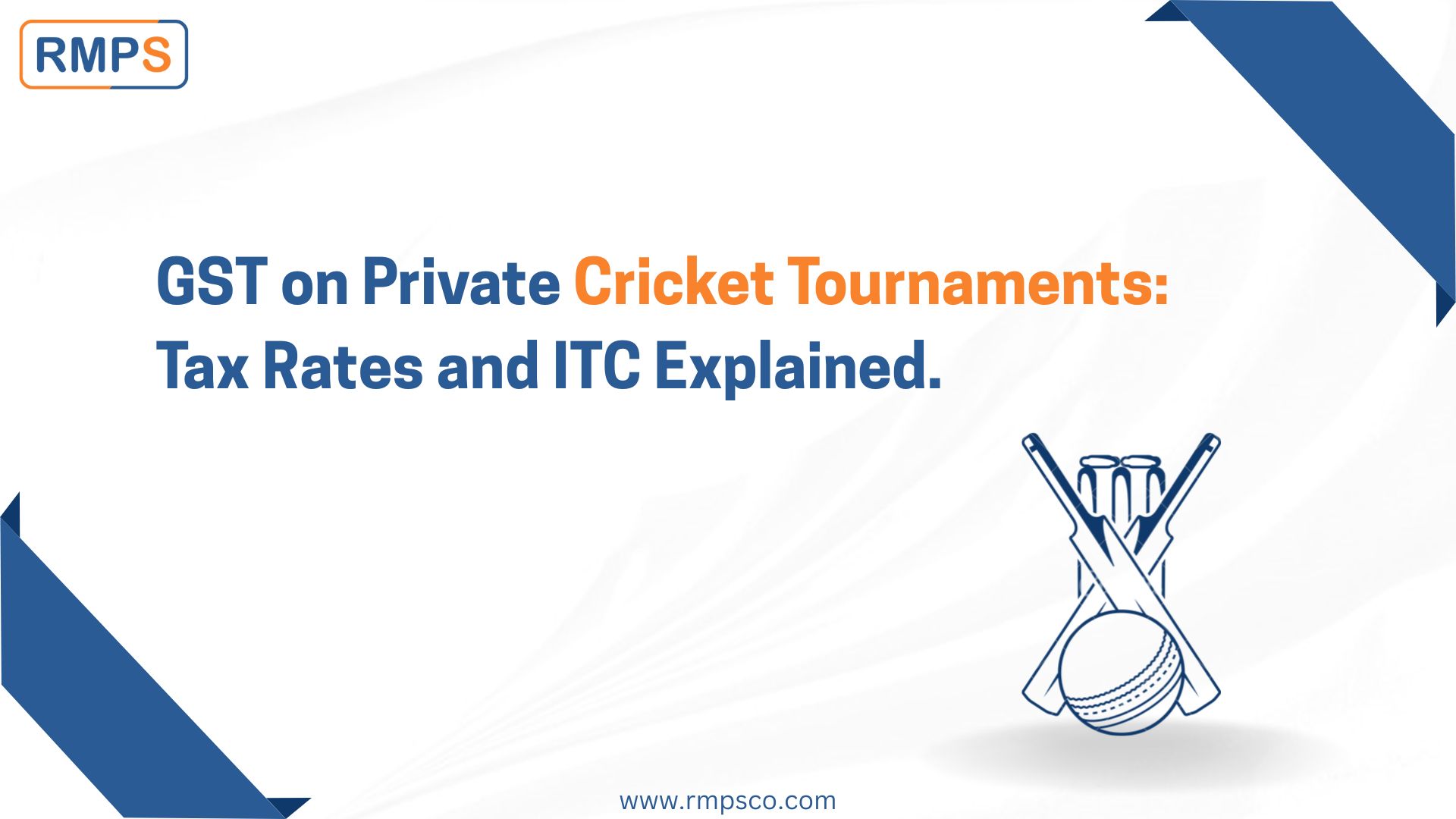
Introduction
Private cricket tournaments are gaining popularity in India, offering exciting opportunities for players and organizers alike, However, GST compliance is a crucial aspect that event organizers must consider. Since these tournaments fall under commercial sporting events, they attract specific GST rates on various transactions. Understanding these tax implications ensures proper pricing, compliance, and financial management. This guide will provide a clear breakdown of GST regulations applicable to private cricket tournaments.
1. GST on Ticket Sales – 28% GST
- Who Pays?
- Spectators purchasing tickets.
- Organizers collect and remit the GST.
- Applicable GST Rates:
- 28% GST → If the ticket price per person when event is organized by private organization.
- 18% GST → If the ticket price per person when event is organized by Govt. sports Body.
- Example Calculation: 5,000 tickets @ ₹600 each
- Revenue: ₹30,00,000 and GST (28%): ₹8,40,000
- Total Collection (Incl. GST): ₹38,40,000.
- ITC Eligibility: In this case, ITC can be claimed on venue rental, ticket printing, security, and advertising.
2. GST on Sponsorships – 18% GST
- Sponsorship Services Provided by a Body Corporate:
- Any Recipient: When a body corporate (e.g., a company) provides sponsorship services, the supplier (the body corporate) is responsible for charging and remitting 18% GST under the Forward Charge Mechanism (FCM). Therefore, the company charges GST and remits it to the government.(As per Notification no. 07/2025 – Central tax rate).
- Sponsorship Services Provided by Individuals or Unregistered Entities:
- Recipient is a Body Corporate or Partnership Firm: If an individual or unregistered entity provides sponsorship services to a body corporate or partnership firm, the recipient is liable to pay 18% GST under the Reverse Charge Mechanism (RCM).
- Recipient is an Individual or Unregistered Entity: In cases where the recipient is an individual or unregistered entity, therefore, the supplier is responsible for charging and remitting 18% GST under the Forward Charge Mechanism (FCM).
- Example Calculation: Sponsorship Amount: ₹10,00,000 and GST (18%): ₹1,80,000
- Scenario 1: If a company provides sponsorship services to any recipient, the company charges 18% GST and remits it to the government.
- Scenario 2: If an individual provides sponsorship services to a company, the company (as the recipient) pays 18% GST under RCM.
- Input Tax Credit (ITC) Eligibility:
- For recipients paying GST under RCM, these entities can claim ITC on the tax paid, provided that they meet the general ITC conditions.
- For suppliers paying GST under FCM, they can claim ITC on their input services related to providing sponsorship, as long as they meet the eligibility criteria outlined in the GST law.
3. GST on Participation Fees – 18% GST
- Who Pays?
- Teams or players paying entry fees.
- Organizers must charge and collect 18% GST.
- Example Calculation: 20 teams pay ₹5,000 each
- Revenue: ₹1,00,000 and GST (18%): ₹18,000.
- ITC Eligibility: ITC can be claimed on venue rental, marketing, and event costs, provided that the expenses are for business purposes and meet the general conditions for claiming ITC.
4. GST on Broadcasting Rights – 18% GST
- Who Pays?
- TV channels, YouTube streamers, or media platforms purchasing rights.
- Organizers charge and collect 18% GST.
- Example Calculation: Broadcasting rights sold for ₹15,00,000 and GST (18%): ₹2,70,000.
- ITC Eligibility: ITC can be claimed on camera rentals, production costs, and media services, as long as these expenses are used for business purposes and satisfy the conditions set by GST law.
5. GST on Merchandise Sales – 12% to 28%
- GST Rates:
- 12% GST → Cricket bats and balls.
- 28% GST → Items such as cricket helmets, pads, and gloves are subject to this rate.
- Example Calculation: Bats sold (₹2,00,000) → GST (12%) = ₹24,000.
- ITC Eligibility: In this case, ITC can be claimed on merchandise procurement costs.
6. Input Tax Credit (ITC) on Tournament Expenses
- ITC Available on:
- Venue rentals , Security services.
- Marketing & advertising
- Ticket printing & event logistics
- No ITC on:
- Food & accommodation (Even if GST is paid, ITC cannot be claimed).
Conclusion
GST compliance is a crucial aspect of organizing private cricket tournaments in India. Consequently, failing to adhere to tax regulations can lead to unnecessary penalties and financial setbacks. Therefore, by understanding applicable GST rates, registration requirements, and Input Tax Credit (ITC) eligibility, organizers can ensure a hassle-free and legally compliant event.
Proper tax planning not only helps in avoiding legal complications but also improves overall financial efficiency. Staying updated with GST rules and maintaining accurate records will enable organizers to focus on delivering a successful tournament without tax-related concerns.
LinkedIn Link : RMPS Profile
This article is only a knowledge-sharing initiative and is based on the Relevant Provisions as applicable and as per the information existing at the time of the preparation. In no event, RMPS & Co. or the Author or any other persons be liable for any direct and indirect result from this Article or any inadvertent omission of the provisions, update, etc if any.
Published on: March 27, 2025
